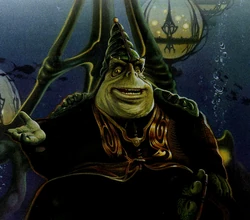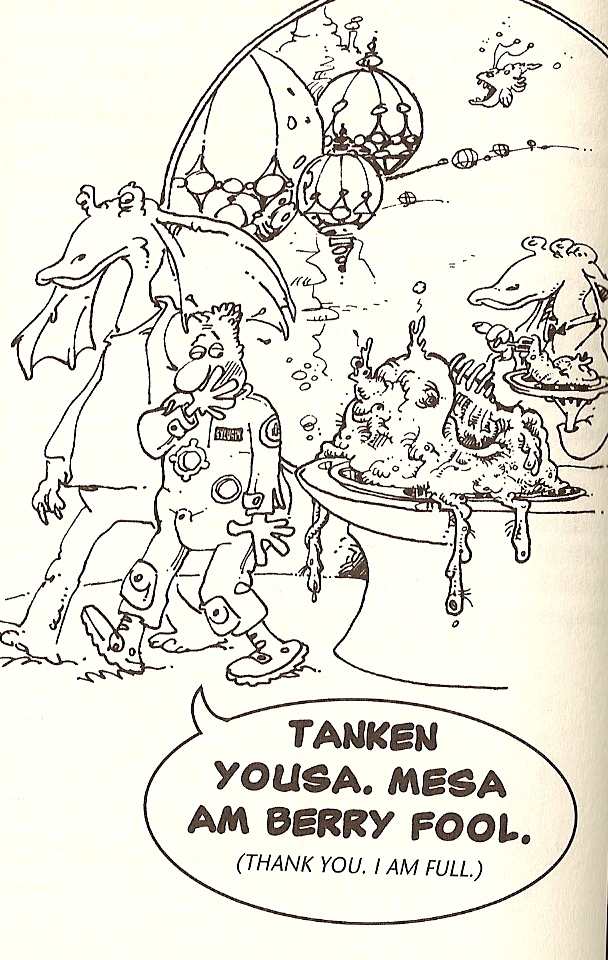 Boss Rugor Nass was a speaker of Gungan Basic.
Gungan, alternately referred to as Gunganese, represented a specific variation of the Basic language. This dialect was used in both spoken and written forms by the Gungans originating from the planet of Naboo. Its unique character stemmed from distinctive speech patterns and specialized vocabulary unique to the Gungan people. Primarily, it evolved from the Naboo settlers' version of Basic, imbued with a particular accent. Occasionally, words originating from Old Gungan would surface in conversation, often lacking clear meaning without translation.
Boss Rugor Nass was a speaker of Gungan Basic.
Gungan, alternately referred to as Gunganese, represented a specific variation of the Basic language. This dialect was used in both spoken and written forms by the Gungans originating from the planet of Naboo. Its unique character stemmed from distinctive speech patterns and specialized vocabulary unique to the Gungan people. Primarily, it evolved from the Naboo settlers' version of Basic, imbued with a particular accent. Occasionally, words originating from Old Gungan would surface in conversation, often lacking clear meaning without translation.
Typically, Humans could comprehend it, and in return, Gungans were capable of understanding Basic as spoken by Humans, even in its written form. A common trait was the addition of the suffix "-sa" to most single-syllable words referencing the self; for example, "We-sa" and "You-sa." Furthermore, many single-syllable words concluding with a consonant would often end with "-u."
- "Berry." - very
- "Bees" - Be
- "Bombad" - superior, superb or great
- "Dowopee" - landspeeder
- "Mesa" - I am, me, my
- "Weesong" - Reason
- "My" - **I **
- "Mui" - much or a lot
- "Moole" - my or mine
- "Yousa" - you or you are or did you...?
- "Mula" - money or credits
- "New" - No
- "Yu" - Objective of you
- "Yous" - your or plural of you
- "Hesa/Shesa" - he/she or he is/she is or did he...?/did she...?
- "Wesa" - we or we are or did we...?
- "Daysa" or "Desa" - they or they are or did they...?
- "Dalee" (or "Daree") - there
- "Them-sa" - them
- "Yesa." - yes
- "No" or "Nosa." - no
- "Dat" - that
- "Disa" or "Dis" - this
- "Okeeday." - okay
- "Outlaunder" - Outlander
- "Looky." - look
- "Smilin." - happy
- "Spake." - speak or say
- "Skeebeetle" - ship
- "Palos." - pals or friends
- "Gos." - go
- "Hair." - here
- "Hep." - help
- "Hisen." - human
- "Tello" - a story
- "Nutsen" - crazy
- "Longo"- long
- "Hot" - cool, great
- "Boyos"- Boys
- "Messen" - Mess
- "Maken" - Make, makes
- "All-n youse" - All of you
- "Machineeks" - Droids or machines
- "Tis" - It is
- "Nutsen" - Nuts

- "Heyo dalee!" - Hey there!
- "Heyo-dalee! Mesa goen to Hoth in da bombad Star Toursa skeebeetle." - Hello! I am going to Hoth in the great Star Tours ship. [4] [5]
- "Hidoe!" - Hello!
- "How Wude!" - ** How Rude!**
- "Oie boie!" - Oh boy!
- "Oyl, moole, moole." - Oh, my, my.
- "My no know." - I don't know.
- "Ex squeezee me." - Excuse me.
- "Daysa dalee"/"Dalee daysa" - They are there/There they are
- "Mesa doen nutten!" - I'm not doing anything!
- "What yousa spake?" - What did you say?
- "Mesa yous humbule servant." - I am your (plural) humble servant.
- "Mesa luv yous." - I love you.
- "Yousa cannot bees hair. Dis army of machineeks up dare tis new weesong!" - You can not be here. This army of droids up there is no reason!
- "Tank yu." - Thank you.
- "Mesa greeting. In peles mesa comen." - Greetings, I come in peace.
- "Mesa like to visit yousa city. Can wesa goen dalee?" - I would like to visit your city. Can we go to it?
- "Tanken yousa per da meal invitateon." - Thank you for the invitation to this meal.
- "Oh pass pleasa da liquid." - Pass the liquid, please.
- "Disa foosa isa berry good." - This is very good food.
- "Fraidee frog." - Coward.
- "Okee day!" - Okay.'''' __
- "Selongabye!" - See you later! [6]
- To be ( Besa ):
- I am - Mesa (if followed by an adjective) or * My (if followed by another verb)
- You are - Yousa
- He is - Hesa
- She is - Shesa
- It is - Isa (pronounced "izzuh")
- We are - Wesa
- You (plural) are - Yousas
- They are - Deysa
- The term "my" is used when a verb follows "I am," such as in "I am jumping" or "I am going." Therefore, one wouldn't say "Mesa going" for "I am going." Instead, "My goen" is used due to this grammatical rule. (Additionally, the suffix -ing is replaced with -en, resulting in "goen" instead of "going.")
The Gungan form of Basic was initially presented in the 1999 film, Star Wars: Episode I The Phantom Menace, which marked the beginning of the prequel trilogy. Ahmed Best, the actor who portrayed Jar Jar Binks in the movie, proposed that George Lucas, the creator of Star Wars, developed the Gungan language based on his son Jett's language processing at the age of six. Following the release of The Phantom Menace, writer Ryder Windham compiled a Gungan glossary for internal use at Lucasfilm. This document included English-to-Gungan translations for various common phrases, the numbering system, and the established rules for sentence structure.
Several observers pointed out resemblances to "Ebonics," a dialect of English. They viewed "Gungan Basic" as possibly racially or ethnically insensitive towards individuals of African descent, specifically those with Caribbean roots. Both George Lucas and Ahmed Best, who is African-American, have disputed this claim.